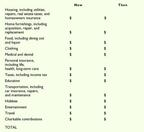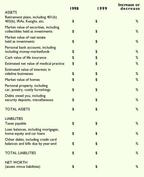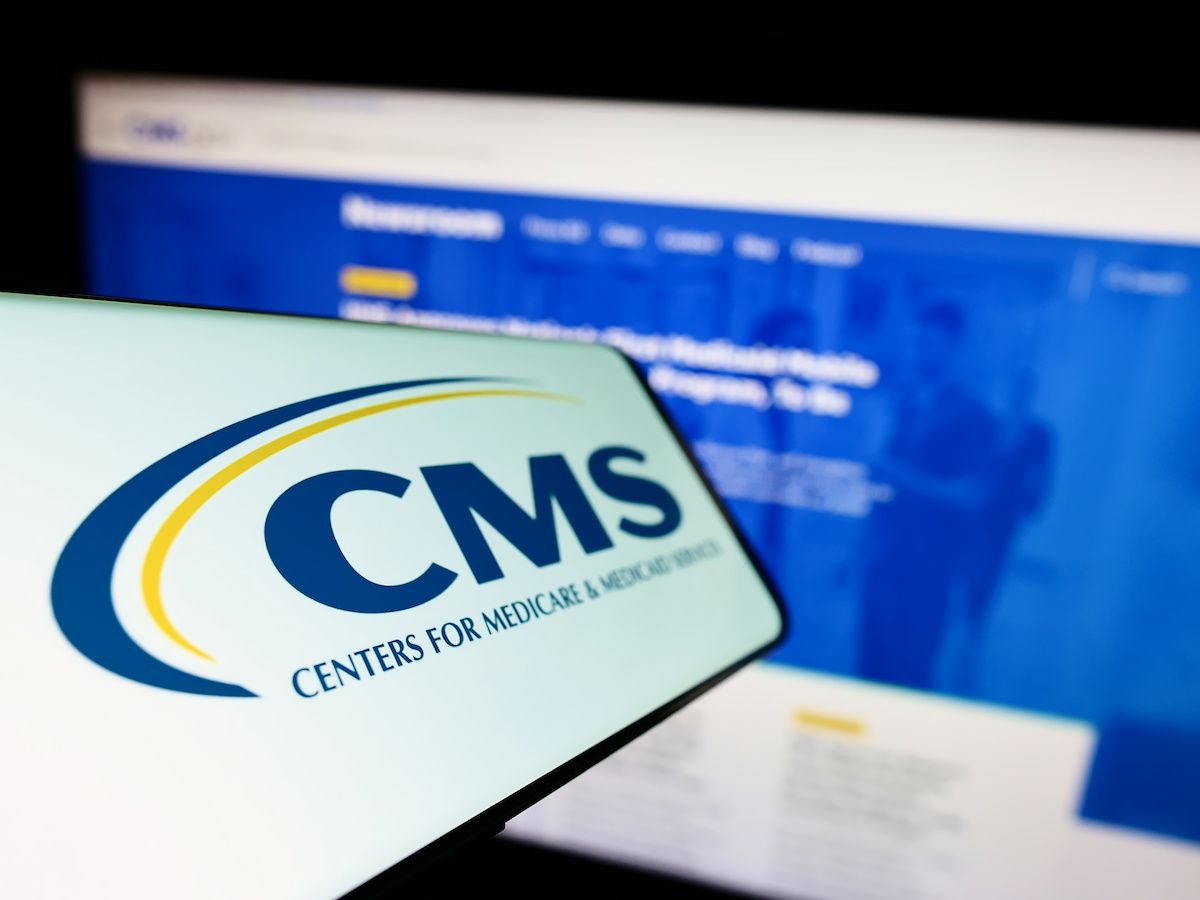Article
First, know exactly what you're worth
You can't just let the chips fall where they may. You'd better see how the pile has grown and whether you're measuring its true value. (This is the net worth article for the 2000 Financial Guide.)
First, know exactly what you're worth
2000 Financial Guide
You can't just let the chips fall where they may. You'dbetter see how the pile has grownand whether you're measuring its truevalue.
By Brad Burg, Senior Editor
Would you take a road trip without a gas gauge?
Every morning, you're a day closer to retirement. If you don't pull overoccasionally to check on your net worth and how fast it's growing, you don'treally know whether you'll be able to reach your destination.
The job is easier than you might think. Granted, doing the calculationswas tough in the pre-computer era, even with the guidance of worksheets.Change one assumption, and you'd have to redo all your figures. Today, however,with retirement-planning software, you or your financial adviser can quicklyexplore any number of possibilities.
"I'll sit down with a doctor, and soon we can arrive at a specificgoal--for example, to provide for his retirement needs, he must put awayan additional $2,000 a year," says planner Curt Anderson, of Champaign,IL. "That's concrete, and we'll know it's reasonable within a wholearray of assumptions."
Before you can meet with your adviser or plug numbers into your computer,you do face a little grunt work. You must round up many details from thisyear and last, so you can check your progress . Go through tax returns,brokerage records, and other monthly statements to get the value of pensions,bank accounts, and securities. Include the value of life insurance, partnerships,or real estate.
Call real estate agents to get a fix on your home's worth, from salesprices for comparable houses. Look up auto values in one of the price guidesavailable at newsstands, or get the numbers online at a site such as www.edmunds.com or www.kbb.com.You might also find out the worth of collectibles, jewelry, and costly furnishings,too, if you'd consider them saleable assets.
If you own your practice, list a value for it, based on a buyout agreementor an estimate by a practice management expert who knows the local market.
Finally, subtract your liabilities: taxes, home mortgage, home equityloans, education loans, credit card debt, and any unpaid balances on accountwith vendors.
Now you're ready to start estimating your living expenses in retirement.
An often-cited rule of thumb says you should figure on 70 percent ofwhat you need now. That's reasonable; after all, many physicians do livemore modestly in retirement. Age, physical limitations, and other factorsslow people down.
But be cautious before assuming you'll cut back, at least in early retirement.Many doctors don't ease their pace--or their spending--until afterage 75, notes estate-planning attorney David J. Schiller, of Norristown,PA. "My clients rarely sit in rocking chairs on the front porch duringthe first retirement years."
Kathleen Stepp, a financial planner in Overland Park, KS, concurs, notingthat for many people, retirement means that hours formerly devoted to earningmoney turn into time used for spending money. "Many new retireesspend much more than they had been formerly, especially if they're healthyand like to travel," Stepp says. "Many of my doctor clients fitthat profile."
Once you figure out how much you have now and how much you'll need annuallyin retirement, it's time to calculate how big a nest egg you've got to accumulate.Here's where things get complicated and computers come in handy.
For instance, it's relatively easy to estimate how much you'll need peryear in today's dollars, but how will inflation affect your income needs?How about changes in investment returns and in your tax bracket? The effectof capital gains? Social Security? Your life expectancy? Does your nestegg have to be big enough to produce your income from earnings, or are youwilling to dig into principal? With computer software, you can plug in avariety of assumptions, and with relatively little effort, find out justhow much you'd have to save to stay on track in various scenarios.
When looking at those scenarios, be conservative with your estimates,especially regarding assets whose equity you may not realistically be willingor able to tap. "Many doctors treat home equity like any liquid balance-sheetasset," says Steven B. Enright, a financial planner in River Vale,NJ. But as Enright observes, the equity is often like the retired doctorsthemselves--in the home, and not out earning anything.
"Living in a $750,000 house you own free and clear is great,"Enright says, "but all that money isn't producing a dollar of income.And I see many doctors who don't free up any equity by trading down in retirement."Although a house belongs on any list of assets, Enright doesn't automaticallyfactor its value into retirement-income calculations.
Philadelphia attorney James L. Griffith, Sr. prefers not to include the worthof such things as collectibles, jewelry, and works of art, too. "Yourarely get full value on their sale," he notes.
Here are some other areas where you should make cautious assumptions:
Inflation. "Everybody has a hard time believing the way numbersmight look in 20 years," says financial planner Allan Kane, of Cranford,NJ. Recently, inflation has been a mild 2 percent or less annually. However,that still means your first 2 percent of "growth" is really zero:You're staying even. Or falling behind. Inflation has at times been muchworse. Around the early 80s, rates were in the teens. To be safe, considerthe possibility of steeper increases.
Health care costs. Medicare won't cover all your health care costs.For example, it pays little or nothing for long-term care, which you mightneed even if you're not ill but require assistance with what's termed the"activities of daily living." An aide could easily cost $150 aday. That's over $54,000 a year, a cost that could strain even a well-offdoctor's budget.
School costs. If you'll be sending kids to college, better estimateon the high side. A year at a top private college already runs more than$22,000--and that's just tuition. Moreover higher-education costs have beenrising much faster than the general inflation rate. In 10 years, even ifcollege costs increase a relatively modest 5 percent a year, the tab forfour years will be in the neighborhood of $160,000.
Aging relatives. In your retirement planning, no doubt you'veconsidered that you might live longer than people used to. But have youthought about what that means in terms of your own mom and dad? FP CharlesDavant, of Blowing Rock, NC, no longer needs to worry about raising hischildren, who are now adults. But he and his wife still have four livingparents in their 80s. "To us, this could mean additional financialburdens in the future," he notes. "So it's something I have tofactor into my retirement picture."
Say you've plugged in all your assumptions, and the computer spits outbad news: Your net worth isn't growing fast enough to fund a comfortableretirement. Now what?
You have several options. Boost your savings rate, either by workingextra hours now or postponing retirement. Or invest more aggressively, especiallyif you're young enough to incur additional risk. Another often-overlookedtactic is to curtail your spending. "A crude but effective form ofretirement planning consists of cutting up your credit cards," saysNew York City financial adviser and Medical Economics columnist LewisJ. Altfest.
Allan Kane notes that retirement-planning software can account for differentlevels of personal spending. "You can immediately show how quicklythe money you save can grow into a substantial amount, and then how muchincome it can eventually produce. Then you're not simply budgeting--you'replanning, which is much more satisfying. And you're much likelier to stickwith it."
My Best Financial Move
"In 1988, after my husband and I started our medical practices,we put all our extra money into paying off our 15-year, $80,000 home mortgage.We did it in just four years. Since then, we've avoided debt by postponingrenovations and other big purchases until we've saved enough cash for them.
Paying off the mortgage saved us many thousands in interest and freedup almost $860 a month. We've used that money to make home improvements,save for our kids' college educations, and invest in stocks, mutual funds,and real estate. And it's reassuring to know that no matter what may happenin the future, at least we'll have our home."
--Susan P. Emmerson, MD
How much green will you need for the golden years?
Will you move to a modest condo, or to a mini-mansion near the firsttee in a posh retirement community? Will you play bingo three nights a week,or take a round-the-world cruise? Here's a worksheet to help you pondersuch questions.
Use today's dollars for the lefthand column, then work with your financialadviser, or with a financial calculator or retirement-planning software,to see what the righthand column might look like, after inflation.

Another reason to figure your net worth
Watching how your net worth grows isn't just valuable for telling youhow much to sock away every year. It can suggest some estate-planning strategies,too.
In retirement planning, it's dangerous to overestimate the income certaininvestments may produce. But estate planning introduces an opposite peril:underestimating what will be counted in your taxable estate, which can hurtyour heirs.
The classic mistake concerns the amount--currently $650,000--that a personcan give or leave tax-free to anyone other than a spouse. (No limits applyto transfers to a spouse.) Attorney David Schiller explains the problem:"Suppose each spouse has that much in assets, and the first to dieleaves everything to the survivor. That's a missed chance to leave a tax-free$650,000 to the couple's children. As a result, an extra $211,000 in taxeswill be paid needlessly, when the children inherit from the surviving parent."But the couple could have set up trusts with income going to the survivingspouse and assets eventually passing to the kids, thus protecting the wholefamily while avoiding the tax.
How does net worth figure in? "Many people," Schiller begins,"don't realize they'll leave enough for heirs to be hit hard by estatetaxes." You need to keep track. The figures involved are scheduledto increase almost every year from now to 2006, when that individual tax-freelimit will hit $1 million. But by then, you're likely to be worth much more,so you'll need to take additional estate-planning steps.
And are you certain how taxable-estate boundaries are drawn? Insuranceproceeds may be inside, unless you plan otherwise. Jointly owned propertymay or may not be, depending on who paid for it, for example. So when totalingyour current and projected wealth, consider bringing all the figures toan estate planner, if you've never done so. You may find problems--and alsosolutions that might save your heirs thousands of dollars in taxes.
Taking stock of what's yours
For most of your financial planning, you should use computer software.But the starting point for your projections is apt to be your current networth--a figure you may have to estimate separately, depending on what softwareyou're using.
Gather the facts you'll need and enter them here. These figures can helpyou estimate your future wealth, but remember to make adjustments for whatwill really be available. For example, many retirement-plan funds are taxableon withdrawal. And some or all of your home equity will probably remaintied up in a roof, walls, and floors.

Brad Burg. First, know exactly what you're worth. Medical Economics 1999;21:44.





